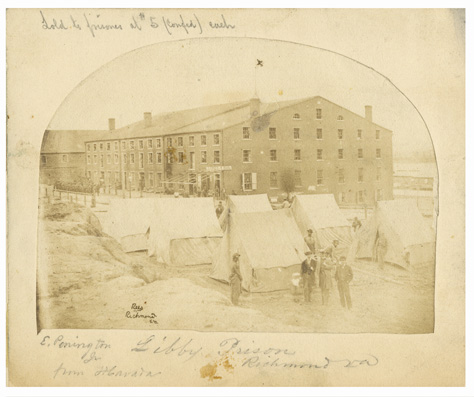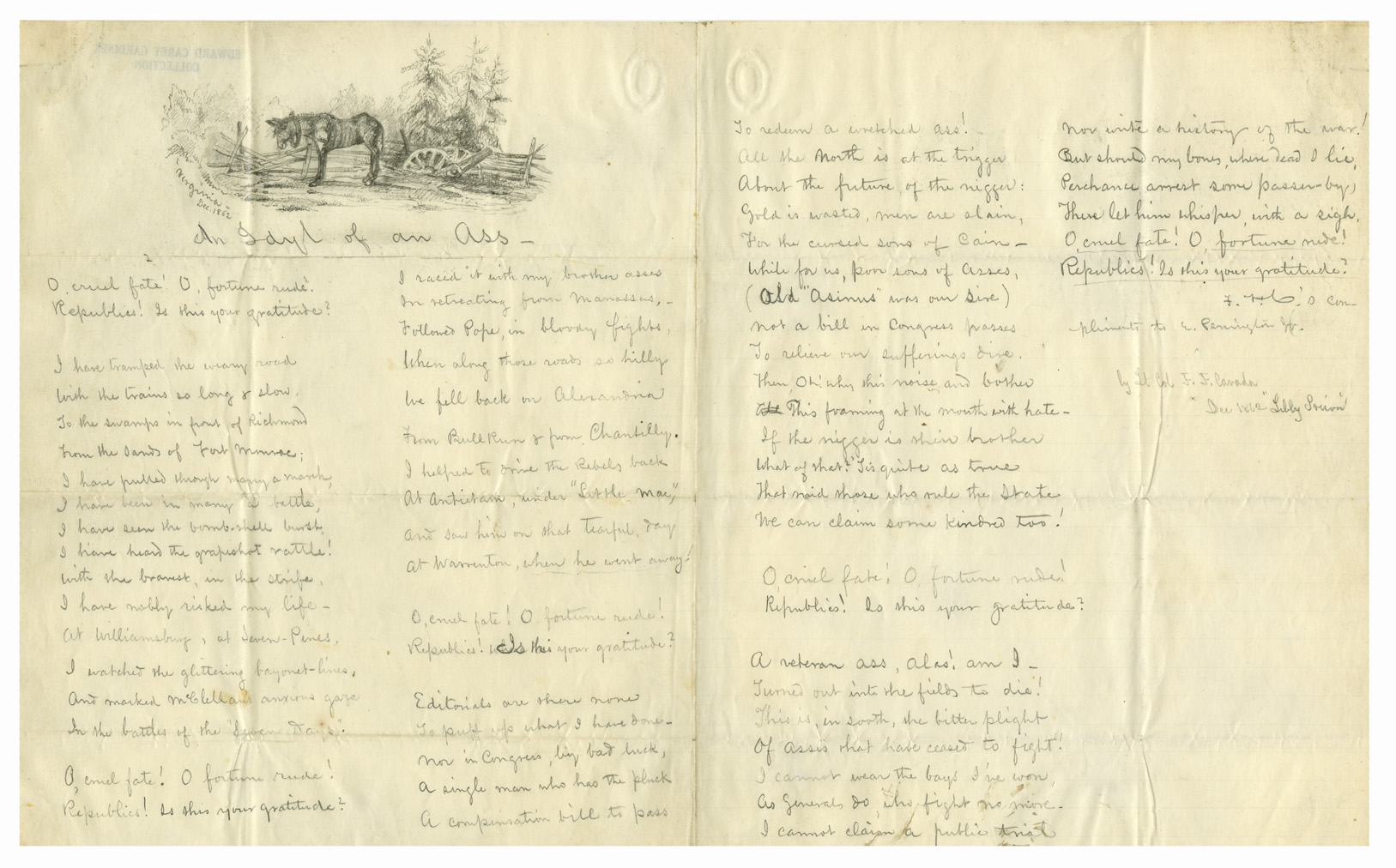This article appeared in the free monthly HSP Newsletter, History Hits.
***
 At the outbreak of the American Civil War, Adolph and Frederick willingly enlisted in the Federal forces, serving as captains of various companies in the Philadelphia 23rd PA Infantry Regiment. Adolph served with distinction in the Army of the Potomac from Fredericksburg to Gettysburg and was a "special aide-de-camp" to General Andrew Humphries. Frederick transferred to the 114th PA Infantry Regiment, rising to the rank of lieutenant colonel. Frederick gained notoriety as well from his writings, sketches, and paintings related to his incarceration as a prisoner-of-war in the infamous Libby Prison in Richmond, Virginia (pictured at right). Below is a poem written by Cavada in 1862. He writes: "I have pulled through many a march, I have been in many a battle, I have seen the bomb-shell burst, I have heard the grapeshot rattle! With the bravest, in the strife, I have nobly risked my life."
At the outbreak of the American Civil War, Adolph and Frederick willingly enlisted in the Federal forces, serving as captains of various companies in the Philadelphia 23rd PA Infantry Regiment. Adolph served with distinction in the Army of the Potomac from Fredericksburg to Gettysburg and was a "special aide-de-camp" to General Andrew Humphries. Frederick transferred to the 114th PA Infantry Regiment, rising to the rank of lieutenant colonel. Frederick gained notoriety as well from his writings, sketches, and paintings related to his incarceration as a prisoner-of-war in the infamous Libby Prison in Richmond, Virginia (pictured at right). Below is a poem written by Cavada in 1862. He writes: "I have pulled through many a march, I have been in many a battle, I have seen the bomb-shell burst, I have heard the grapeshot rattle! With the bravest, in the strife, I have nobly risked my life."  Though raised in Philadelphia, both brothers continued to maintain a strong connection to their native isle of Cuba. After the American Civil War, the Federal government appointed the brothers to Consular positions--Frederick in Trinidad and Adolph in Cienfuegos.
Though raised in Philadelphia, both brothers continued to maintain a strong connection to their native isle of Cuba. After the American Civil War, the Federal government appointed the brothers to Consular positions--Frederick in Trinidad and Adolph in Cienfuegos.
***
Adolph (Adolfo) Fernandez Cavada and Frederick (Federico) Fernandez Cavada were born in Cienfuegos, Cuba, sons of a Cuban father and Emily Howard, a native of Philadelphia. When their father died, the boys and their mother moved to Pennsylvania. They were educated in private schools and graduated from Central High School.
 At the outbreak of the American Civil War, Adolph and Frederick willingly enlisted in the Federal forces, serving as captains of various companies in the Philadelphia 23rd PA Infantry Regiment. Adolph served with distinction in the Army of the Potomac from Fredericksburg to Gettysburg and was a "special aide-de-camp" to General Andrew Humphries. Frederick transferred to the 114th PA Infantry Regiment, rising to the rank of lieutenant colonel. Frederick gained notoriety as well from his writings, sketches, and paintings related to his incarceration as a prisoner-of-war in the infamous Libby Prison in Richmond, Virginia (pictured at right). Below is a poem written by Cavada in 1862. He writes: "I have pulled through many a march, I have been in many a battle, I have seen the bomb-shell burst, I have heard the grapeshot rattle! With the bravest, in the strife, I have nobly risked my life."
At the outbreak of the American Civil War, Adolph and Frederick willingly enlisted in the Federal forces, serving as captains of various companies in the Philadelphia 23rd PA Infantry Regiment. Adolph served with distinction in the Army of the Potomac from Fredericksburg to Gettysburg and was a "special aide-de-camp" to General Andrew Humphries. Frederick transferred to the 114th PA Infantry Regiment, rising to the rank of lieutenant colonel. Frederick gained notoriety as well from his writings, sketches, and paintings related to his incarceration as a prisoner-of-war in the infamous Libby Prison in Richmond, Virginia (pictured at right). Below is a poem written by Cavada in 1862. He writes: "I have pulled through many a march, I have been in many a battle, I have seen the bomb-shell burst, I have heard the grapeshot rattle! With the bravest, in the strife, I have nobly risked my life." One of the most vivid and articulate accounts of the Battle of Gettysburg comes from the pen of Adolph, who kept a diary during the war (pictured below). His eye-witness experience of the famous conflict provides a highly descriptive and informative rendition of the heroism, horror, and sounds of battle. During one of the days during the July battle, he recorded how "The air was soon full of flying shot, shell and canister--and a groan here and there attested their affect. ...the roar of musketry and the crashing, pounding noise of guns and bursting shells was deafening... "
 Though raised in Philadelphia, both brothers continued to maintain a strong connection to their native isle of Cuba. After the American Civil War, the Federal government appointed the brothers to Consular positions--Frederick in Trinidad and Adolph in Cienfuegos.
Though raised in Philadelphia, both brothers continued to maintain a strong connection to their native isle of Cuba. After the American Civil War, the Federal government appointed the brothers to Consular positions--Frederick in Trinidad and Adolph in Cienfuegos. During the War of Cuban Independence, which broke out in 1868, the two brothers resigned from their commissions and became acutely involved in the Cuban Army of Liberation from Spain. Both became officers in the uprising, with Frederick becoming the commander in chief of all Cuban revolutionary forces. Both brothers lost their lives during the fight for Cuban independence.
Frederick, called the "Fire King" by the Spanish authorities during the above struggle, was captured, court-martialed, and sentenced, with the rumor he was to be hanged. Many of his former friends and military compatriots with whom he'd served with in the Union Army--including Generals George Gordon Meade, Daniel Sickles, and Ulysses S. Grant--attempted to obtain his release without success.
Sometime during the month of July in 1871, Frederick Cavada was taken to Puerto Principe and executed. During the hour of his death, it was reported that Cavada calmly "conversed with some friends," smoked a cigar, and walked "erect and proud to the place of execution" where he flung his hat to the ground "and in a loud tone of voice cried, 'Adios Cuba, para siempre' (Goodbye Cuba, forever)." After this a volley was fired and Cavada was killed.
The Cavada brothers, natives of Cuba and residents of Philadelphia, fought for both their adopted and native lands. Their story attests to the patriotic heritage that is a significant part of not only one family, but of the Hispanic community as a whole.

No comments:
Post a Comment